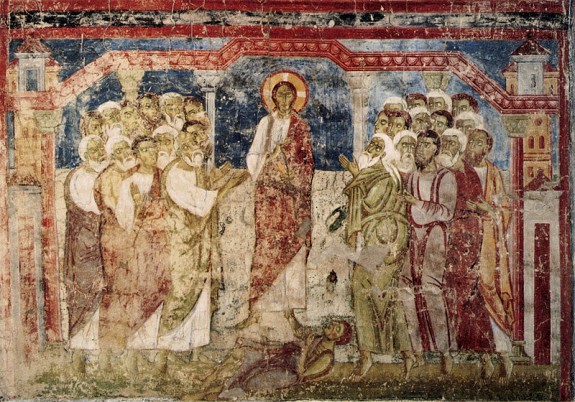11th century fresco of Christ performing exorcism in the synagogue in Capernaum via Wikipedia
Several days back, just before the State of the Union speech, the New York Times ran a lengthy profile of the man who would be putting all those words in President Obama’s mouth: Cody Keenan, the 34-year-old speechwriter the President has nicknamed “Hemingway.”
The Times article described weeks and weeks of writing and rewriting—sending drafts back and forth between different offices, deciphering the President’s notes in the margins, all in an effort to craft something both monumental and memorable in about 6,000 words.
Well, history will decide whether or not he succeeded—whether all those words changed any hearts or minds.
But if you want to know the true power of words, consider one word uttered by Jesus in this gospel we just heard—a word that changed a life and that actually made history:
“Quiet.”
With that one command, the man who would go on to calm a storm at sea calms the raging storms inside one anonymous figure in the synagogue.
With that one word, a miracle—the first miracle in Mark’s gospel—will begin.
With that one word, attention must be paid.
“Quiet.”
It’s a great irony, really: the scriptures this Sunday again and again call us to listen to God, to hear his voice, to attend to his teaching. But the word that commands the most attention is a call for silence.
It certainly got the attention of the people in the synagogue—and the man possessed by demons. Sometimes God’s most astonishing work needs silence. It is the setting for miracles, and even conversion.
I was reminded of this just yesterday. Yesterday, January 31st, marked the 100th birthday of a man whose own conversion became one of the most famous in the 20th century: Thomas Merton. He grew up in Douglaston, Queens, studied at Columbia and Oxford, loved jazz and cigarettes and beautiful girls, and then fell head over heels in love with Christ. He became a Catholic, then a few years later, a Trappist monk.
Christ called out to the raging demons within Merton’s heart, “Quiet!” And he embraced a life of silence in a monastery in Kentucky.
“The contemplative,” Merton once wrote, “waits on the Word of God in silence and when he is ‘answered,’ it is not so much by a word that bursts into his silence. It is by his silence itself, suddenly, inexplicably revealing itself to him as a word of great power, full of the voice of God.”
Silence, it turns out, is “the voice of God.” That is how God works. That is how he is heard.
We don’t know much more about this particular episode in Mark’s gospel. The man possessed by demons is one of those characters in scripture who appears, and then vanishes. Like so many who encounter Christ and are changed forever, he’s never heard from again. We don’t learn what happened to him.
But maybe we don’t need to know.
What matters is that he encountered Christ and was transformed.
In that sense, it is a story that should resonate with each of us.
It’s significant, I think, that this early miracle in the Christ’s ministry is profoundly personal. It doesn’t entail feeding thousands or bringing someone back from the dead. No, this is one-on-one, and it involves an interior transformation.
On one level, of course, it is a morality lesson. It is about good conquering evil. But it also involves a conversion of heart and mind and spirit.
It is the healing of a troubled soul. At the very outset of his public ministry, Christ gave peace. Even now, he offers comfort to the anxious, calm to the distressed, hope to those in despair.
How many today need that message? The world is starving for it. We live in a time when many are suffering from demons they might not even be able to name. Depression. Anxiety. Worry. Sometimes, the demons might even be other people.
But in the face of all that, this gospel offers simple reassurance. Whatever demons might be afflicting us, Jesus can call them out.
Christ’s first word to that troubled man is his word to all of us, no matter what troubles are possessing us: Quiet.
Centuries before this miracle, the psalmist put it another way: “Be still and know that I am God.”
Confronting this scripture today, it’s worth asking ourselves: what parts of our lives do we need to make quiet? What inner demons are keeping us from being still—and knowing God?
How can we make ourselves more open to truly hearing his word, and letting it change our lives?
Let us pray to make that happen, to tune out whatever is getting in the way, to lower the volume of daily life and find times to be quiet with God—and to quiet our own fears or uncertainties— and let him in.
As the man in this gospel learned: it is often how miracles begin.












